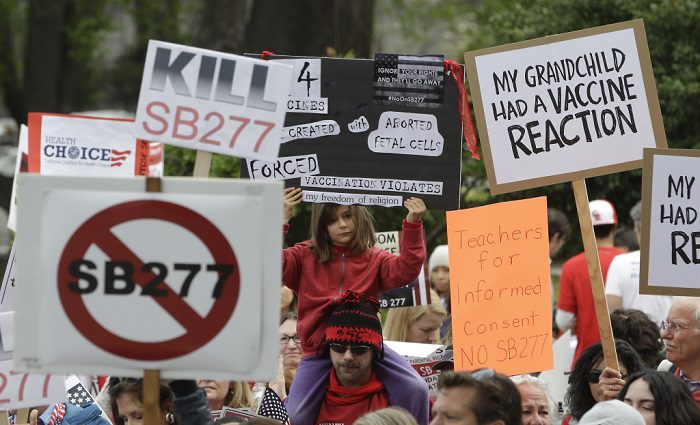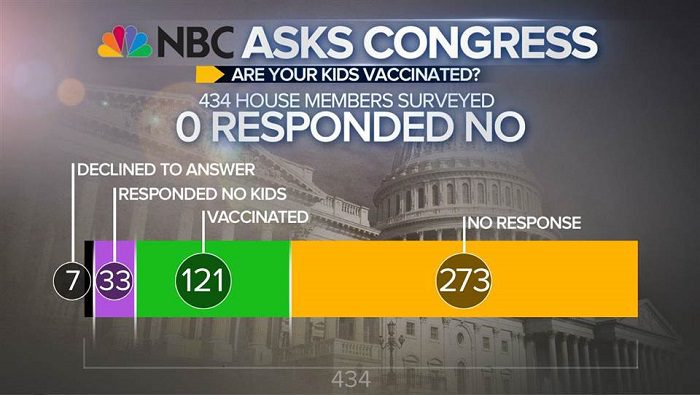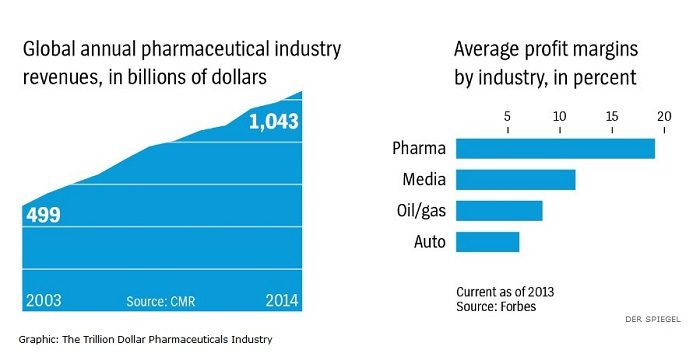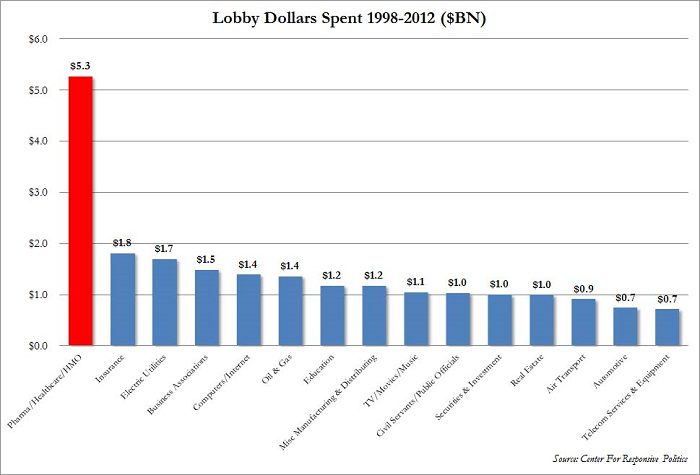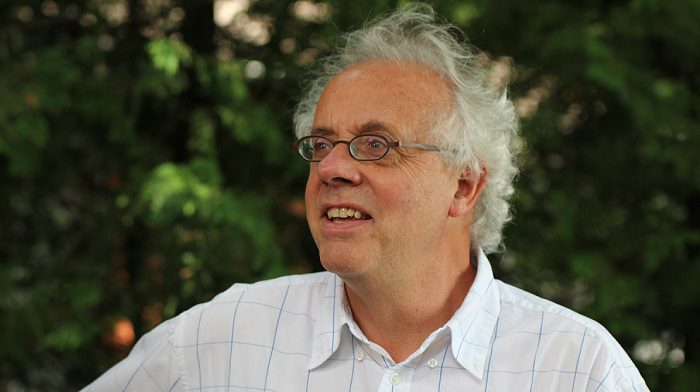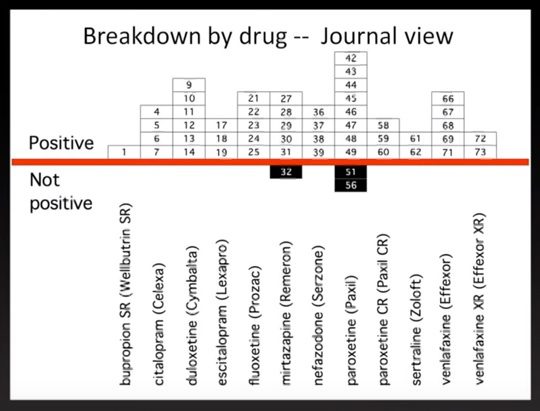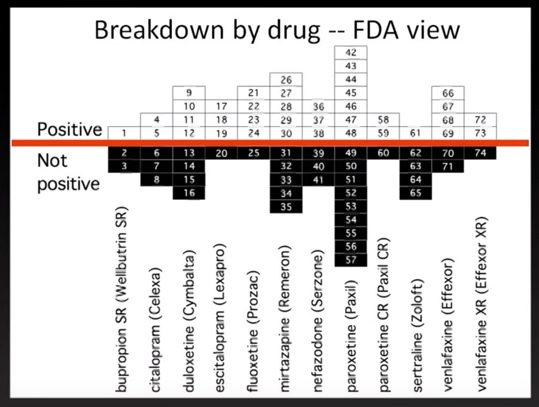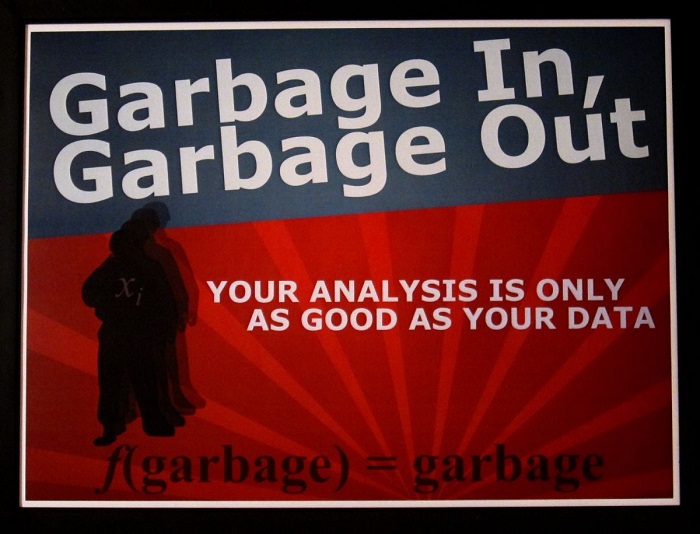A Comprehensive Review of Vaccines – Part 1 of 12
What is With All These Vaccine Skeptics?
Most people have a difficult time understanding why any parent would choose not to vaccinate their children. After all, we have been assured by our doctors that clinical trials show that vaccines are safe and effective and that we need to vaccinate to protect everyone. So what’s the reason for these people to refuse vaccination for their children?
Unfortunately, the further we objectively researched the whole body of evidence surrounding vaccines, the more difficult we found it to come to the conclusion that vaccines are safe and effective. The truth is, there isn’t just one reason for vaccine skeptics to forgo vaccination. There are many.
Parents, (and people in general), are discouraged from researching vaccines and are told to blindly trust the experts. In fact, there is a running vaccine skeptic meme that goes something like this: “Parents did some google searches on vaccines and now they think they know more than scientists or doctors.”
Yes, it’s true, researching vaccines probably won’t get you any closer to an epidemiology degree, however, there are more than a few highly credible scientists and doctors with conflicting information about vaccines, and most people will be very surprised to find out what is being put forth as scientific studies these days. It became clearer to us after completing our own extensive research on why researching vaccines is discouraged like it is.
One of our primary goals with this series is to shed light on the fact that there is an enormous amount of credible information that directly contradicts the official story presented to the public about the safety and efficacy of vaccines. This is information that you won’t hear from traditional media sources and is not currently part of the national vaccine debate.
In fact, there is so much information that this article needed to be written in a 12 part series to properly present just a fraction of the information available. Most people already know the official version of this story which is what’s broadcast the loudest and most often to the masses.
We want to present the other side of the story that vaccine skeptics see when researching the topic, to give some perspective on what makes up their belief system. No meaningful debate can occur in the absence of the whole spectrum of information.
It is not our intention to offend vaccine proponents and our hope is that the information presented here might help bridge a growing divide between the two sides of the debate. Our health officials and the news media are using fear and completely exaggerating the risks of disease in the U.S. as well as the risks un-vaccinated children pose, which is pitting neighbor against neighbor and parent against parent, using the classic divide and conquer strategy.
Vaccine skeptics are experiencing a lot of pressure to conform through bullying, name-calling, shunning, and discrimination. Because of this acrimony, some hard lines have been drawn. Unfortunately, this has the effect of shutting down any meaningful dialogue between the two sides, obscuring the facts and preventing progress. This strategy serves to keep the truth of the matter more elusive than ever.
This article is actually written for vaccine proponents and we are asking for a cease-fire for one moment so we can present some of the evidence that skeptics see when evaluating the decision to vaccinate. At the very least, we would like to give vaccine proponents a better understanding of the reasons behind the decision of so many not to vaccinate.
Vaccine skeptics know why vaccine proponents believe in their position – because most skeptics started as vaccine proponents. But we don’t think proponents really know why skeptics feel the way they do. Rather than summarily dismissing vaccine skeptics, it is far more productive to understand why they feel the way they do because they do have valid concerns.
We would venture to say that over 90% of the general public is not aware of all the information presented in this twelve-part series. With any luck, vaccine proponents will see the information which skeptics have seen, and realize that there is enough conflicting data to make any parent think twice about vaccinations. In the final analysis, maybe we can agree that skepticism can be a healthy perspective and those who choose not to vaccinate are not the lunatic fringe we’ve been led to believe.
We also hope that after reviewing all the information presented in this series, vaccine proponents might feel more compassion toward skeptics. Many skeptics were pro-vaccine until an adverse event or death of one of their children caused them to change their stance. Imagine how heartbreaking and frustrating it is to have a perfectly healthy child one day and then, hours or days after they’re vaccinated, watching them develop a debilitating condition or even die.
Imagine then having your doctor tell you it was just a coincidence. Then, to add insult to injury, you may be ostracized by your friends, media, and community when you decide against vaccines for your other children. As a parent of a vaccine-injured child, you saw the cause and effect with your own two eyes but no one validates your experience.
This is why we urge compassion when dealing with these parents — their worlds have been turned upside down. We also hope to open a productive dialogue between the two sides and find out the truth behind this complex issue together, because this is something that affects all of our children.
“Intelligence: Not because you think you know everything without questioning, but rather because you question everything you think you know.” – Unknown
Authors’ Disclosure
We would like to disclose right from the start that, although we are knowledgeable about the topic of vaccines through countless hours of research, we are not epidemiologists or scientists. We are not doctors or medical experts and we do not pretend to give medical advice. We are not here to tell anyone whether they should vaccinate and the information in this article is for educational purposes only.
Our intention is to present data that is only found through diligent research and to let our readers decide where they come down on the issues. We will, however, provide a narrative that is based on the information we’ve learned, our belief systems, and personal biases – and all we have written in this article should be viewed as such.
We are an independently funded research team in pursuit of the truth behind complex issues. We have no control over advertisements that may appear throughout this 12 part series. All personal examples used in this article are real and from one of the people on our research team. Each part of this series is designed to be a stand-alone article, and for that reason, we may present the same material in a number of places to make different points.
Although we have provided a comprehensive look at vaccines in this 12 part series, this is by no means all the information available about vaccines. For the sake of brevity, we had to leave a lot of information out. This article, however, can be a good starting point for informing people who are new to the subject and wish to get underway with their own research efforts. All of the material we used is public information and we provided as many links as possible so our readers could do their own research and come up with their own conclusions.
Because we are told that vaccines are supported by a mountain of evidence, we thought it would be best if we start the series by looking at the quality of information presented to the public about vaccines as well as the sources behind the information, and then work our way through the various topics. All twelve parts of the series are linked at the bottom of each article. From here on in we will be narrating as one person, using “I” instead of “we”.
Okay, now that we have that out of the way, let’s get started!
The Debate is Far From Over
There is a raging debate going on between people who are for vaccines and those who are skeptical of them and this has been further exacerbated by a new law on the books in California that eliminates personal and religious vaccine exemptions, regardless of parent beliefs or concerns (SB277). There is also proposed federal legislation in the works that would eliminate most vaccine exemptions nationwide. As a result, this has brought a lot more awareness to the issue, and with that, more people are researching vaccines and educating themselves on the topic. It seems that the more people are learning about vaccines, the more they are deciding that it is not worth the risk to vaccinate.
Don’t Be Too Quick to Judge Vaccine Skeptics
As we see in the above video, vaccine skeptics are mocked and made fun of in popular culture. They are called deniers, stupid, ignorant, and ‘anti-science’ (and those are the nice names) because of their beliefs, but the evidence tells us a different story. It turns out that vaccine skeptics are not the stereotypical complacent or uneducated demographic portrayed in the media. What we see in this video is a total lack of understanding regarding the choice of some people not to vaccinate, as well as a gross misunderstanding of the real issues.
Here is a 2008 article titled, “Highly Educated Parents Were More Likely to Stop Their Children From Being Vaccinated” in which British economists held a discussion that concluded with the fact that vaccine skeptics were better educated and more affluent than previously thought.
Here’s an article from investigative reporter Jon Rappoport titled, “Top Government Scientists Say No To Vaccines For Their Kids” showing that parents who work for the federal government with science degrees are among those who do not vaccinate.
Here is an article from the Albuquerque Journal titled, “Los Alamos schools top NM in vaccine exemptions”, which reveals that the heart of the scientific community is where the highest number of unvaccinated children reside. This article notes that “the major New Mexico school district with the largest percentage of students opting out of vaccinations against contagious diseases is not in one of the state’s known hotbeds for crystal gazing, cradle therapy or psychic readings. Nope, the highest percentage of vaccine exemptions is in New Mexico’s, and one of the world’s, science centers: Los Alamos.” And the paper reflects on just who lives in Los Alamos:
It’s a town founded on science, and the scientific evidence is overwhelming that vaccines don’t cause autism or other developmental disabilities. Many people in Los Alamos don’t just have college degrees – they’re scientists, with lots of degrees. Los Alamos National Laboratory in fact has done some heavy research on infectious disease and development of an HIV vaccine.
Here is an article from the Chicago Tribune earlier this year, featuring some highly educated moms who decided against vaccines.
Here is a study conducted by Kaiser Permanente, mapping the ‘under-vaccinated’ in California. Although they use the data to make a pro-vaccine point, it’s telling that the pocket of skeptics in Northern California isn’t declining vaccines for financial reasons. Parents with graduate degrees are less likely to vaccinate, according to this study.
Silicon Valley is home to prestigious universities such as Stanford and U.C. Berkeley. It is known as a global hub for innovation, attracting some of the best and brightest minds in the world and it also represents a pocket for vaccine skeptics.
Here is another article that counts the affluent and highly educated among the ranks of anti-vaxxers.
Malibu, California is one of the most affluent communities in the world with many highly educated residents and they are also among the most un-vaccinated populations in the nation. In an article titled, “Malibu Vaccination Rates Way Below State Average” the author describes greater numbers of un-vaccinated among the affluent:
“Clusters of non-vaccinated children appear most often in affluent areas, including Marin County, Santa Cruz, Malibu and some private schools. In a 2012 Associated Press survey, Saint Aidan’s in Malibu, Westside Waldorf in Pacific Palisades, Oak Grove in Ojai and Highland Hall Waldorf in Northridge topped the list of the unvaccinated among 1,600 schools.”
How Many Vaccine Skeptics Are In Congress?
In a poll conducted by NBC News in 2015, only 28% of congressional members would come out and say that their children were vaccinated. NBC tried to spin the poll results by stating “Congress is Unanimous on Vaccinations” but as we can clearly see, that is not the case.
I think it is safe to say that vaccine skeptics come in all shapes and sizes and are not the ignorant, complacent, uneducated group we are told. Based on these examples, many of them are well educated, affluent and apparently, informed. It would certainly be difficult to argue that the Los Alamos skeptics are anti-science, being that science is their occupation. This is a trend that seems to be increasing.
Vaccine Skeptics
I have spoken with many people on both sides of the debate, including doctors. After doing my own extensive research, I have a pretty good idea where people are coming from on this issue. When speaking with people who are concerned about vaccines, I find them to be critical thinkers with a genuine interest in learning about vaccines, and in most cases, they are well informed and quite knowledgeable on the subject. Skeptics also tend to be independent thinkers who march to the beat of their own drum and do not succumb to peer pressure very easily. This is evidenced by their willingness to stand strong in their position even though 80% of the population disagrees with them.
I think it’s a fundamental misunderstanding and a big mistake to stereotype vaccine skeptics as ignorant or write them off as kooks because they’re simply not. They are parents who want the best for their children and they’re willing to put in the time and energy on the tedious research necessary to discover the facts about vaccine safety and efficacy.
It is not just vaccines these parents are careful about. Most of the ones that I know and have spoken to have a heightened overall awareness of what their children consume and typically do not let them eat things like fast food, junk food, soda or candy. They are quite aware of the current health crisis among our nation’s children and are determined to keep theirs from being a part of those statistics.
In light of the facts that we’ve learned through researching this article, in my opinion, vaccine skeptics have valid concerns, as we all might after carefully reviewing the whole body of the evidence, not just what we are told by the television and newspapers.
Vaccine Proponents
When I speak with vaccine proponents about safety and efficacy, my questions are often met with sarcasm, condescension, and even hostility, in some cases. This is particularly true of doctors. I’ve presented several doctors with research and, not only were they unfamiliar with it, they became visibly upset with me.
Doctors have proceeded to lecture me using canned rhetoric, referencing Jenny McCarthy and Andrew Wakefield, and pointing out that they are not credible sources. I never mentioned their names, so it seems like they’re reciting some sort of central talking points memo where these two names always come up.
I’ll go on to ask, “what if studies published in peer-reviewed journals are not reliable?” As you might imagine, that doesn’t go over well, nor should it. Peer-reviewed journals have always been the pinnacle of reliable science. Studies published in prominent, peer-reviewed journals form the basis for medicine as we know it. I’ll ask if they have heard about a particular expert or what the editors of medical journals have had to say about clinical trials and they’ll be unfamiliar and grow more impatient with me.
These conversations usually end rather abruptly and awkwardly. After asking these questions, I am treated as if I am a lesser citizen and dismissed with condescension as if I’m a child. It’s like we are not allowed to question vaccines and I should be ashamed for even bringing up my concerns. I could imagine such a response if I were questioning someone’s religion.
I found that there is a strong cognitive dissonance at play with most vaccine proponents I encounter and they show no curiosity to hear anything that will conflict with their current belief system. When names like Jenny McCarthy, an actress, are brought up to try and make a point about vaccination, it is clear to me that they are relying on traditional sources of media and have simply not seen, or else refuse to look at, all the information that is available on the topic.
In my opinion, there are very few scientific truths in this world that are so complete and so certain that they cannot be altered when challenged by evolving science, new information, and unconventional viewpoints. This is why I like to keep an open mind on any subject that I am contemplating. New information is always shifting our understanding of long-held beliefs, especially those that date back hundreds of years ago.
It’s About Trust
When we look at people on both sides of the debate we find one significant dichotomy that separates the two groups. Trust. Vaccine proponents trust the medical data and the institutions that provide it. They think that vaccine skeptics are quacks or conspiracy nuts for not following suit. On the other hand, vaccine skeptics do not trust the data or the institutions that provide it and they think proponents are being naive.
Parents’ prior experiences may have a lot to do with their positions, too. One parent may have vaccinated their child with no problems or adverse effects, while another parent’s child may have been seriously injured or died right after receiving vaccines. Depending on which parent you are in that scenario, who you trust is a matter of personal perspective.
Trust on either side is the bigger underlying issue in people’s decision to vaccinate. It supersedes all of the other issues being talked about in the debate. You either trust what doctors and the medical establishment say or you’re skeptical. Trust is particularly important when we receive health advice because we’re dealing with the lives of our children and loved ones. We certainly do not want to rely on untrustworthy institutions or information when making healthcare decisions for our families.
Trust will be a running theme throughout this 12 part series because it is an extremely important part of the debate which is not being discussed. As with any business – and let’s be clear, healthcare is a business – trust is primary. Madison Avenue is paid billions of dollars to instill public trust in the business brands they represent. Successful companies know that when consumer confidence wanes, so do sales. One very important question is: Can we trust that our doctors are properly informed about the true data behind vaccines?
Where Do Doctors Learn About Vaccines?
Most people trust their physician’s advice and do not give a second thought about where doctors learn their information. The plaques and degrees on the walls of his or her office assure us that our doctors are well educated in medical school and that we are in good hands.
Because the medical field is so complex, we almost instinctively defer our power to our doctors. This is much like we might behave with an attorney. The legal system is so complex that we would be foolish to try and navigate it without a lawyer. But what if the information our doctors are using to make decisions is flawed? Relying on experts is smart and it usually benefits us. Blind, unquestioning faith, however, is something very different.
The truth is that most doctors are taught very little about the science behind vaccines or pharmaceutical drugs in their formal studies. The average doctor is only taught the basic theory behind vaccines and defers to published studies for any further understanding of the topic.
Many of these studies come from medical schools that receive grants and medical journals that are sponsored by those who make vaccines. Most Americans would probably be surprised to know that nearly all of the information our doctors receive, in one form or another, comes from the very businesses who have the most to gain by doctors’ promotion of their product.
It is well documented that pharmaceutical companies, along with the medical establishment, have created and shaped the curriculum taught in medical academia. In many cases, professors at some of the most prestigious medical schools are also paid consultants to multiple pharmaceutical companies. The New York Times published an article titled “Harvard Medical School in Ethics Quandary” in which they describe these unethical relationships.
Pharmaceutical companies spend billions of dollars every year marketing their product directly to doctors, many times under the guise of education. It is really not difficult to see the inherent conflict of interest in this practice. If the companies and institutions providing the information were honest about their findings and their true mission was health discovery, this might not be so bad.
Unfortunately, there has been a wide array of industry insiders and whistle-blowers from the pharmaceutical and medical industries who have come out in the last decade and they are all telling us the same thing: the medical industry has been compromised from top to bottom.
The medical research and the journals that publish clinical studies on pharmaceutical products are not accurate and cannot be trusted. They tell and show us how negative reactions in clinical trials are often suppressed or manipulated so that the published studies do not reflect the true risks of a pharmaceutical product. There is also overwhelming evidence that proves this to be the case. Apparently, this is common knowledge to those in the industry.
How Accurate Are Medical Journals?
Vaccine clinical trials, published in peer-reviewed medical journals, are held in the highest esteem among our medical community. This is the evidence pharmaceutical companies present to the FDA in order to have drugs approved in the US. Doctors must follow the CDC’s recommendations and they prescribe their patient’s medications based on the findings of these studies.
We are told that there’s a mountain of published information that proves vaccines’ safety and efficacy, but when we probe into that mountain we find many problems. Let’s take a closer look at this research and the journals that publish it.
FDA Oversight and the Problem with Trust
Here is the abstract for an article by Charles Seife, MS, published in JAMA in April, 2015. This paper reveals huge ethical breaches found by the FDA when they inspected the sites of clinical drug trials between 2008 and 2013. The author finds 57 published clinical trials inspected by the FDA during this period had significant evidence of:
- Falsification or submission of false information [22 trials, 39%]
- Problems with adverse events reporting [14 trials, 25%]
- Protocol violations [42 trials, 74%]
- Failure to protect the safety of patients and/or issues with oversight or informed consent [30 trials, 53%]
- Inadequate or inaccurate record keeping [35 trials, 61%)
The paper notes that when these breaches occur, the FDA “has no systematic method of communicating these findings to the scientific community, leaving open the possibility that research misconduct detected by a government agency goes unremarked in the peer-reviewed literature.” Actually, this is exactly what happens: Only 4% of the research found to have significant violations mentioned any such problems when the research was published. Seife notes: “No corrections, retractions, expressions of concern, or other comments acknowledging the key issues identified by the inspection were subsequently published.”
A few key things to remember when looking at these findings:
- These infractions occurred in research that became published clinical trials,
- The FDA doesn’t inspect very many clinical trial sites. A Vanity Fair article from 2010 revealed that in the sample year 2008, the FDA inspected about 1.9% of trial sites for research conducted in the US (and less than 1%, when the research takes place outside the country).
A skeptic would be left with a number of additional questions about how much we can trust published vaccine research:
- How many of all vaccine clinical trial sites are inspected by the FDA?
- How many of those inspected have ethical breaches or problems with conditions or practices?
- Did the landmark research ‘proving ‘ vaccines to be safe and effective undergo FDA inspection during the trials? If so, did they have similar breaches?
- How representative are these findings of all clinical drug trials?
- If clinical trials are published as valid and reliable, even after the FDA finds major issues with the research, what is the purpose of inspection?
- What about the 96% of published clinical trials that didn’t reveal the problems the FDA found with their research? Is there anybody or organization that requires researchers to uphold these standards or are they on the honors system?
- What do these findings mean for the integrity of the FDA approval system?
The conclusion of this paper makes a sound case for skepticism when considering published vaccine research. The author explains the larger problem with journals:
“When the FDA finds significant departures from good clinical practice, those findings are seldom reflected in the peer-reviewed literature, even when there is evidence of data fabrication or other forms of research misconduct.”
The Journal of the American Medical Association (JAMA) addressed the gravity of this problem in an editorial printed in the same issue in which Seife’s research is published. Based on the preview available on their webpage, it looks like JAMA might share some of the same concerns we outlined above.
Unfortunately, if you want to read the whole article, you will have to subscribe to the journal or pay $30 to view it for 24 hours. If you preview this editorial, you can see that they note that FDA inspections cannot even be linked to particular clinical trials. It seems strange, indeed, that an organization charged with protecting the public health would be so invested in protecting those they regulate from public scrutiny.
Major Academic Publisher Finds Fraud in 10 of Its Journals
Medical News Today aptly describes the peer review process as being central to the medical journal publication process, noting that it is “held as the best available means to help check the quality, relevance, and importance of papers being submitted by medical researchers. This in turn helps to ensure that medical treatments are safe and effective for patients.”
Peer-reviewed medical journals have historically been considered highly credible sources because they use the peer review process to vet research before publishing it. More and more lately, we’re finding out that authors, researchers, and journal editors are manipulating the peer review process in order to get research published. In fact, there is an organization devoted to investigating and publishing news about the retraction of published studies. You can view their website here.
Springer is one of the largest research publishers in the world, owning more than 2,500 English language journals alone. Here is an article published in The Washington Post in August 2015, which describes Springer’s recent retraction of 64 articles from 10 of its journals after discovering that their reviews were linked to fake e-mail addresses.
A few months earlier, in March 2015, another one of Springer’s journals retracted 43 articles for the same reason. The Washington Post article also cites the practice of study authors writing reviews for their own publication and fraudulently submitting them as independent reviews.
“Peer review is supposed to be the pride of the rigorous academic publishing process. Journals get every paper reviewed and approved by experts in the field, ensuring that problematic research doesn’t make it to print. But increasingly journals are finding out that those supposedly authoritative checks are being rigged.”
Springer is certainly not the only medical research publisher to have pulled multiple articles that don’t follow peer review protocol — they just happen to be a recent example.
In case you’re wondering about retractions of vaccine research, specifically, here a few recent examples: Here you can read about the December 2015 retraction of pertussis vaccine research in which the author failed to disclose having received grants and consultancy fees from three pharmaceutical companies that help make or sell the vaccines.
You can read here about the May 2015 retraction of malaria vaccine research in which an author manipulated images that were supposed to reflect data. Read here about a former Iowa State University researcher who pleaded guilty in January 2015, to felony charges after faking AIDS vaccine research results.
The New England Journal of Medicine
Dr. Marcia Angell — Former Executive Editor of the New England Journal of Medicine & Senior Lecturer, Harvard Medical School
Dr. Marcia Angell is the Former Executive Editor of The New England Journal of Medicine (NEJM) and Senior Lecturer at Harvard Medical School. She is also the author of the book Drug Companies and Doctors: A Story of Corruption.
In the video above, Dr. Angell gives an excellent presentation on the incestuous relationship between the powerful pharmaceutical industry, the medical establishment, and our local and federal politicians. She tells us how the pharmaceutical industry has infiltrated every part of the medical system, buying access, and the hearts and minds of our physicians.
Dr. Angell’s statement is shocking:
“It is simply no longer possible to believe much of the clinical research that is published, or to rely on the judgment of trusted physicians or authoritative medical guidelines. I take no pleasure in this conclusion, which I reached slowly and reluctantly over my two decades as an editor of The New England Journal of Medicine.”
Dr. Angell goes on to say that drug companies portray themselves as organizations dedicated to science and health, but that is simply not true. Pharmaceutical companies are, by a large margin, among the most profitable companies in the world but they only spend a small portion of their revenue on research & development, compared to marketing and administration costs.
She also points out that despite all the studies that they conduct, pharmaceutical companies are only responsible for about 15% of new innovation in their field. Instead of focusing on innovation, they choose to spend their vast resources on influencing doctors and medical research to favor their predetermined outcome, regardless of the safety or efficacy of their drugs.
Dr. Angell points out that the pharmaceutical lobby is the largest in Washington, spending billions each year to influence legislators and policymakers and, as she puts it, “the pharmaceutical companies nearly always get what they pay for”.
Are our elected officials basing the increasingly aggressive vaccination schedule on safety concerns or could their decisions be based on the billions of dollars that pharma has fed the political machine? As Dr. Angell says, it’s useful to follow the money in this situation.
Imagine what it might do for your industry if you could spend billions of dollars every year lobbying politicians. In 2003, when the federal prescription drug program for seniors was being created, the pharmaceutical industry spent $116 million to keep Medicare from bargaining for competitive drug prices.
Their lobbying paid off because it netted them an extra $90 million a year, (on the backs of our seniors might I add), for a whopping 77,500% return on their investment. That is just one deal they made. As you will see in part three of this article, some of those lobbying dollars go to vaccine policymakers as well.
There are many other credible industry insiders, doctors, researchers, and whistleblowers who corroborate Dr. Angell’s findings. Again and again, they are telling us that the information circulated among our healthcare experts and the public is simply not reliable, and therefore cannot be used to make informed decisions about our health.
According to these insiders, most studies are directly or indirectly funded by pharmaceutical companies. Research data that support pharmaceutical products are highlighted and published, while research that finds problems with drug safety or efficacy is suppressed and never sees the light of day.
What About Other Medical Journals?
Dr. Angell is not an outlier and she is far from alone in her expert opinion, criticizing the validity and reliability of medical journals and their publishing practices. Several other editors of some of the world’s most prestigious peer-reviewed medical journals have also come forward recently. They, too, are warning us that medical research data is being manipulated and that there is an utter corruptness about what gets published in these journals.
The British Medical Journal
Dr. Richard Smith
Dr. Richard Smith was the editor and chief executive of the BMJ Publishing Group for 13 years, and worked for BMJ for a total of 25 years. He left in 2004, and in 2006 published the book: The Trouble with Medical Journals.
Smith wrote an editorial that appeared in PLOS Medicine Journal in 2005, entitled “Medical Journals Are an Extension of the Marketing Arm of Pharmaceutical Companies” in which he asserts: “The Problem: Less to Do with Advertising, More to Do with Sponsored Trials”. This former chief executive and editor of the world-renowned medical journal says:
“Peer review is a failure and, ironically, it’s more faith-based than science-based. What passes as ‘science’ today is really a cult of pet opinions pushing an agenda.”
The Lancet Medical Journal
Dr. Richard Horton – Current Editor in Chief of The Lancet Medical Journal
In April of 2015, Dr. Horton published an editorial in The Lancet Medical Journal that corroborates the statements of his fellow editors regarding the trustworthiness of research published in medical journals. This editorial is a quick read and offers a thoughtful perspective on what Dr. Horton refers to as “one of the most sensitive issues in science today: the idea that something has gone fundamentally wrong with one of our greatest human creations.”
Quoting from Dr. Horton’s editorial:
“The case against science is straightforward: much of the scientific literature, perhaps half, may simply be untrue. Afflicted by studies with small sample sizes, tiny effects, invalid exploratory analyses, and flagrant conflicts of interest, together with an obsession for pursuing fashionable trends of dubious importance, science has taken a turn towards darkness.”
“Journals have devolved into information-laundering operations for the pharmaceutical industry.”
Dr. Richard Horton
The Manipulation of Clinical Trials
Dr. David Healy
Dr. David Healy is an internationally respected psychiatrist, psychopharmacologist, scientist, and author of many books on the medical industry, as well as more than 150 peer-reviewed articles. In 2012 he published a book entitled Pharmageddon, about how pharmaceutical companies have hijacked healthcare. Dr. Healy is also an expert in research on the subject of clinical drug trials. He is affiliated with Rxisk.org, which maintains a clearinghouse of patient-reported side effects of all types of prescription drugs.
According to Dr. Healy, the medical industry is at a crisis point now, due to a lack of integrity. He compares its situation to that of the Catholic Church during the child abuse scandal several years ago.
Dr. Healy compares drug companies’ manipulation of published research to that of the science used by the tobacco industry to show evidence in defense of smoking and notes that the only difference is that the manipulation in the medical field is far more sophisticated. In this presentation, Dr. Healy walks us through the process and shows exactly how the data from one particular published medical study were manipulated to make unfavorable data look positive.
From the Rxisk.org site:
“….most data on prescription drugs is owned by the multinational pharmaceutical companies who run almost all clinical drug trials (60% of which are never reported). They simply are not sharing data that may affect their bottom lines.”
Paroxetine: A Case Study
Dr. Healy uses as an example, a well-known controlled study about the use of the anti-depressant Paroxetine to treat children. GlaxoSmithKline (GSK) performed studies regarding the drug and concluded it was ineffective. GSK then cherry-picked the good data from the previous study and assigned authorship of the new publication using a who’s who of some of the most well-known and respected doctors in the childhood psychiatric field. But as Dr. Healy learned, they were not the true authors, as the published study was in fact ghostwritten.
Dr. Healy states that the clinical data published in medical journals may be a small fraction of the data that is accessible through the FDA. Dr. Healy points out that the Paroxetine case study highlights just one example and is not a rare case. This behavior is not unique to anti-depressants but applies to all drugs manufactured by the pharmaceutical industry.
Below are two charts depicting clinical trials of the same exact drugs. The first chart reflects the data that was used to gain FDA approval and represents the published clinical data in medical journals. The second chart contains all the clinical trials conducted for the drugs, including those that were never published.
The white boxes above the red line represent what’s put forth as “positive” studies, or the cherry-picked data, and below the red line is the black boxes which represent the negative studies. If you look at the second chart you will see that there are fewer white boxes (positive results) because a full 30% of the ‘positive’ studies published in the medical journal should actually have been considered to be negative. There are also more black boxes due to new trials and studies that were never published. You could only understand that this was a dangerous drug when looking at all the data. The only place all the data was available was in FDA records, not in the published studies.
Journal View
FDA View
Dr. Healy noted that 100% of the published studies at the time were actually ghostwritten. The published literature showed these drugs to be safe and effective and we now know that in every single case that was wrong. Once all the data was considered together, it painted a much different picture. The published literature was in direct conflict with the data from all available research.
Later in his presentation, Dr. Healy shows us a clinical trial where the author uses miscoding to make it appear as if a patient committed suicide on the placebo when, in fact, it happened after using their drug. Mis-coding is a common practice, used to hide unfavorable data and manipulate the trial results, according to Dr. Healy.
Dr. Healy goes on to say that this is a larger problem than the manipulation of clinical trials by the pharmaceutical industry. This is a system-wide institutional problem with evidence-based medicine. Dr. Healy also tells us that independent research groups with excellent reputations and no financial ties to drug makers are sometimes fooled by these manipulated results and subsequently end up as a marketing tool for pharmaceutical companies.
In another example, The Cochrane Review Group, comprised of independent researchers, only had access to the published information from the journals. When they finished their research they concluded that the drug Sertraline (Zoloft) was the best of all the anti-depressants listed. Once all the data was revealed, however, it turned out to be the worst one. The industry practice of publishing only the research that supports product safety and effectiveness means that sometimes, data can lie. This is how even unbiased, highly ethical researchers can be fooled in their quest for truth.
Dr. Healy Makes it a point to mention several times in his presentation that this is not an isolated incident and that it applies to all pharmaceutical products.
Dr. Tom Jefferson
Dr. Tom Jefferson is the head of the aforementioned Cochrane Collaboration Review Group and is an expert researcher in the field of medicine. Dr. Jefferson has declared that the Cochrane Group will no longer rely on published medical studies to form their conclusions. Not only was Dr. Jefferson unable to access most of the data from clinical trials for the Tamiflu vaccine, he discovered that the authors of the studies had no recollection of presenting the information and actually referred him back to the drug maker. He came to the conclusion that these studies were ghostwritten.
Why is Information So Important?
Information has a powerful influence over our lives because it guides our behavior and drives our decisions. Sometimes there is an agenda behind the information presented to us that we can’t easily see. Information is what forms our belief systems about a particular topic and when the data is manipulated or is not based on valid and reliable science, we must then reexamine our previously held conclusions. Analyzing information is similar to working out a mathematical equation: when you omit evidence or change it to reflect the desired finding, the conclusion will always be flawed. We have more information at our fingertips than we’ve ever had, yet converting the raw data into actionable knowledge is where the heavy lifting is required.
Summary
When you look up the term ‘pseudoscience’ in the dictionary, one of the definitions is as follows: a collection of beliefs or practices mistakenly regarded as being based on scientific method. What we are witnessing with these journals is certainly not science. Our medical journals have devolved into something other than pillars of scientific truth in pursuit of health, and by definition, would have to be characterized as pseudoscience.
Vaccine skeptics are constantly being told that they are anti-science or science deniers, but when we look at the so-called ‘science’, it becomes clear that the exact opposite is true. To be more accurate, vaccine skeptics are taking issue with cherry-picked data, buried studies, fraudulent data and poorly conducted clinical trials, posing as science. Vaccine skeptics are well aware of the fact that our medical journals left the realm of science years ago and have become valuable business tools in the world of economics, marketing and politics.
The fact that so many experts from within the industry are telling us that we can’t trust data published in the most prestigious journals in the world really cuts to the heart of the matter. We are told that the debate is over and vaccines have been proven to be safe and effective, but from what evidence can they conclude this? If pharmaceutical companies sponsor almost all of the research while then also deciding what gets published and what doesn’t, how can we imagine we’re getting reliable information? When we know that the data in these publications have been manipulated in favor of pharmaceutical products, how can we trust it?
The truth is that studies favoring the safety and efficacy of ANY pharmaceutical products published in medical journals can no longer be presumed to have integrity and cannot be safely cited as scientific fact. Arguments that use this data as their foundation must be called out for what they are: agenda-driven misinformation. Unless we have comprehensive independent audits, allowing auditors to review ALL the information, or until trial results can be replicated by independent researchers, the published research on vaccines is not reliable. Published vaccine trial data is lacking the scientific rigor and the integrity we need, in order for it to provide us with the quality of information necessary for giving adequate informed consent.
The information presented in part one of this article alone is enough to make any parent feel skeptical about putting any pharmaceutical products into their children. As you will see in the following parts of this article, medical journals are only one component of the systematic deception and corruption taking place in this industry. When we take a closer look at the behavior of the pharmaceutical industry and their ties with federal and local regulatory agencies, we find behavior that is equally troubling.
This is Part 1 in the 12 part series: A Comprehensive Review of Vaccines
Part 1: Why Are So Many People Choosing Not To Vaccinate?
Part 2: A Closer Look at Pharmaceutical Companies
Part 3: Vaccine Policymakers and Conflicts of Interest
Part 4: How The CDC, FDA, and WHO Lost the Trust of Vaccine Skeptics
Part 5: Are Vaccines Safe & Effective?
Part 6: What Are The Real Risks of Not Vaccinating in the U.S.?
Part 7: Herd Immunity, Shedding and the Questionable Science Behind Vaccines
Part 8: Did Vaccines Really Eradicate Infectious Diseases in the 20th Century?
Part 9: The Conclusive Evidence Linking Vaccines and Autism
Part 10: Why Don’t We Hear The Whole Story About Vaccines?
Part 11: What Are Independent Experts Telling Us About Vaccines?
Part 12: Vaccines: The Greater Good or Greater Greed? – Conclusion
Sources & Credits: Centers for Disease Control, (CDC) Food and Drug Administration, (FDA) World Health Organization, (WHO) Vaccine Adverse Events Database, (VAERS) the National Vaccine Injury Compensation Program, (VICP) The British Medical Journal, The New England Journal of Medicine, The Lancet Journal of Medicine, The Journal of the American Medical Association, (JAMA) The American Academy of Pediatrics, (AAP) cochrane.org, cochranelibrary.com, nvic.org, chop.edu, pubmed.com, globalresearch.ca, propublica.org, openpaymentsdata.cms.gov, westonaprice.org, drpalevsky.com, mercola.com, drtenpenny.com, drsuzanne.net, russellblaylockmd.com, naturalnews.com, putchildrenfirst.org, whale.to, thinktwice.com, healthnutnews.com, vaccineinformationnetwork.com, sanevax.org, sharylattkisson.com, truthinmedia.com, rxisk.org, therefusers.com, truthkings.com, thevaccineraction.org, edgytruth.com, vactruth.com, greenmedinfo.com vaccinechoicecanada.com, vaccinationcouncil.org, vaccineimpact.com, ageofautism.com, CGP Grey, The Vaccine Resistance Movement, The Greater Good Film, Dr. Sherri Tenpenny, Dr. Suzanne Humphries, Dr. Russell Blaylock, Dr. Joseph Mercola, Dr. Lawrence Palevsky, Dr. Lucija Tomljenovic, Dr. Nancy Banks, Dr. Peter Gøtzsche, Dr. Chris Shaw, Dr. Marcia Angell, Dr. Richard Smith, Dr. Richard Horton, Dr. David Healy, Dr. Tom Jefferson, Dr. Raymond Obomsawin, Dr. John Bergman, Dr. Mark Geier, Dr. Boyd Haley, Sharyl Attkisson, Ben Swann, Neil Z. Miller, Sally Fallon Morell, Mike Adams, Robert Kennedy Jr., Jon Rappaport, Leslie Manookian, Barbara Loe Fisher, Gary Null, Erin Elizabeth, Focus Autism and Vision Launch Development Group.
Speed the Shift is an independent group of researchers on a mission to find the truth about controversial topics. We utilize alternative information sources that are often ignored or outright censored by the corporate media in an effort to gain a broader awareness of relevant issues.







